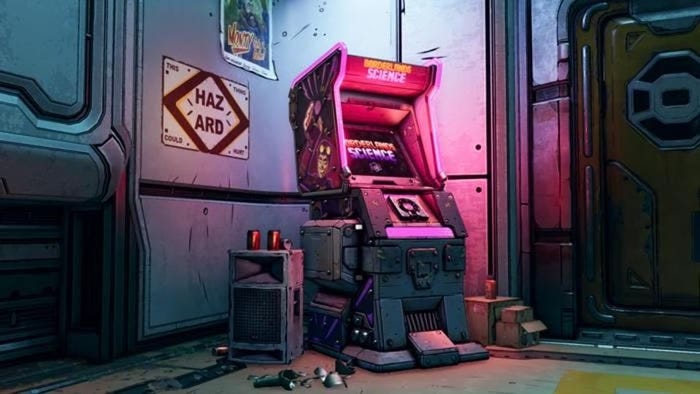Video games in research (Jul. 2024)
Rounding up some interesting research
It’s my birthday today! So I am sending out a different sort of post, and pondering yet another avenue of content. In any case, the newsletter will be on a break next week as I will be camping in the wilderness of Ontario and I am not as organized as many of you who can plan posts in advance (seriously, I admire and envy you all). I’ll see you back on July 24, full of mosquito bites and ready to share some more gaming and science news!
Hello JOMT Reader!
Once in a while, I like to switch things up for fun. So this week, I have a short listicle of research that was published using video games.
TL;DR
Using popular video games for science, research, and health can give a big boost to whoever can take advantage.
Generative AI can help create living virtual worlds that can react more naturally to players (with reasonable boundaries in place).
Playing a game might help us realize how bad we are at communicating complex information (and how we might get better at it).
Using the reach of popular video games for science
Link to article: https://arxiv.org/abs/2407.02798 Title: Game-Based Discovery: Harnessing Mini-Games within Primary Games for Scientific Data Collection and Problem Solving
A while ago, I wrote about Borderlands Science, a mini-game within the Borderlands 3 game, that helped researchers align a million different RNA sequences against each other. This showed how researchers can use our love of playing games to solve problems in science.
In the paper Game-Based Discovery: Harnessing Mini-Games within Primary Games for Scientific Data Collection and Problem Solving, the authors suggest a framework for how mini-games to solve scientific problems can be designed and incorporated into popular video games.
The framework talks about making such mini-games optional and not part of the main storyline. The decision to include a mini-game should also include costs for developing assets and testing the mini-game throughout the development process, even after the game’s release. If the goal of the mini-game is collecting information and analyzing data, like in Borderlands Science, validating the data will be important to make sure that it is useful.
The authors only discussed scientific mini-games for research, but there are more ways to use the information collected while playing games. For example, digital biomarkers, which are things we can measure about our health through our interactions with technology, including games, can be used to diagnose and treat disease.
How cool would it be to know that your time playing Diablo IV helped bring a new drug to market?1
A living virtual world
Link to article: https://arxiv.org/pdf/2404.19721
Title: PANGeA: Procedural Artificial Narrative using Generative AI for Turn-Based, Role-Playing Video Games
I used to play a lot of JRPGs — epic stories with dozens of characters, and hundreds of hours of game play. But there was one thing missing from all of these JRPGs: life. The epic stories were filled with static characters with a limited set of dialogue options, wandering around aimlessly, while I hurdled over them to get to my next quest.
With generative AI, game developers have to option to make these worlds feel alive. The authors of this study created a framework called PANGeA (procedural artificial narrative using generative AI), and applied it to turn-based RPGs to create non-playable characters (NPCs) that can have human-like interactions with the player.
The designs of these NPCs were backed by psychology research about the Big Five Personality Traits and personality theory, giving them life-like wants and needs. They also come with a validation system to make sure that they generate responses that fit with the game environment. The NPCs also have short and long term memory, meaning you can treat them badly and still expect them to help you when you need it.
With PANGeA, virtual worlds can be full of virtual people that feel alive, making the game experience much richer. I can’t wait to see the first RPGs using this technology.
Using games to become better communicators
Link to article: https://www.mededportal.org/doi/10.15766/mep_2374-8265.11411
Title: A Game-Based Tool for Reducing Jargon Use by Medical Trainees
I love sharing science and research news because I realized during my PhD that many scientists are hopelessly bad at talking about their own work. I remember sitting through countless lectures and presentations and feeling lost within the first 5 minutes, wondering about my life choices. As a budding expert in the field, I should have been able to understand the presentation. But I didn't.
These experiences led me to a career of medical and scientific communications, which is part of the reason why you’re reading this post today!
The authors of A Game-Based Tool for Reducing Jargon Use by Medical Trainees designed a clever twist on the game Taboo, to help students explain a medical condition or term without using technical, jargon words.
After some training and a friendly competition between participants, the researchers asked them to rate their experience and score how useful they thought the game was. Overall, the participants felt that they had gotten better at communicating with patients without using jargon, and recommended others to play the game.
A simple application of an age-old game is all it took for some positive results. Now, if only we could find a way for scientists to play this same game…
Fun game time!
If you made it this far, thank you for continuing to support Just One More Turn! I enjoy our conversations as comments, notes, and chats and look forward to even more!
Now, my request: I wrote this over 10 years ago as the opening lines for my PhD thesis and I would like YOU to rate it (rip it apart even) for how well you think it communicates the scientific concept I tried to introduce. Bonus points if you can guess what it is (my committee members hated this opening, but I fought hard to keep it).
Life is good, being surrounded by sibling cells and protected by a selective membrane that allows intake of nutrients necessary for growth but that excludes the rest of the external environment. That is until the host decides he needs to diet and stops eating. Without any new intake of food, you, the cell, are left to find other sources of energy or risk dying. Perhaps it is time to lift any inhibitions about cannibalism and start scavenging for nutrients left by your siblings who have already met an untimely end. Or perhaps it is best to breakdown some unneeded parts inside you to keep living. Just as you are about to make a life-altering ethical decision…
Re-reading it now, I probably would have made different word/phrasing choices — in any case, I await your comments!
It hasn’t happened yet, but I’m hopeful for a future where our time spent playing games can contribute to better health care.







Love the mini game idea. Absolutely loathe the gen AI idea. Happy birthday and have fun camping!
An aspect for the borderlands mini game that was missing for me in this article and the topic in general is aspects of consent from the player. You mentioned the minigame had to be optional and I agree, but the user should also be informed of the intend of such minigame imho. Personally I’m a big fan of this sort of citizen science. Just playing a bit devils advocate here, I know some people would object to „working“ for free in that manner. Even if it is for science.